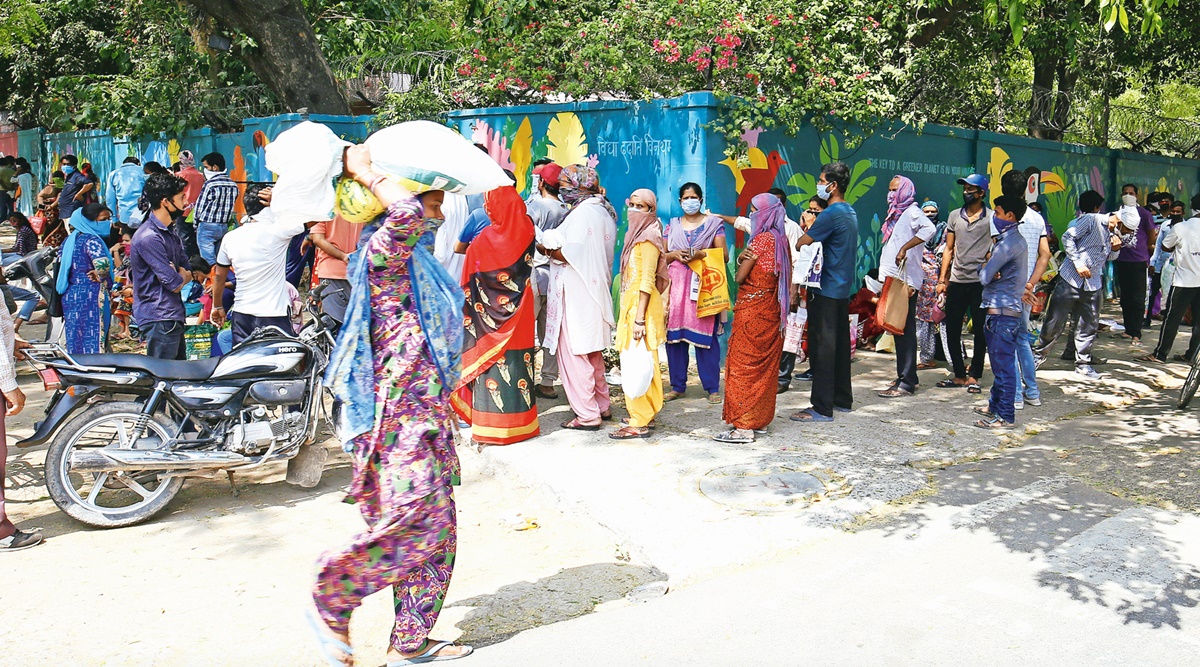 Outside a ration shop. Doorstep delivery was one of the major poll promises of AAP. (Express Archive)
Outside a ration shop. Doorstep delivery was one of the major poll promises of AAP. (Express Archive) Six days before the proposed rollout of a Delhi government scheme to deliver rations to people’s homes, the Centre has raised a red flag, saying the word “Mukhyamantri” cannot be used in the name of a programme to distribute foodgrains under the National Food Security Act (NFSA).
In a letter to the Delhi Food Commissioner, the Union Ministry of Consumer Affairs, Food and Public Distribution has also said that changing the provisions of the Act so as to allow delivery of foodgrains to the doorstep of beneficiaries, would need the approval of Parliament.
The Delhi government is free to launch the scheme “without mixing the elements of the NFSA foodgrains”, the Centre has said. This means that any scheme involving distribution of foodgrains procured separately for that specific purpose, and without using rice or wheat allotted under the NFSA, will be allowed.
The Delhi government had notified the Mukhya Mantri Ghar Ghar Ration Yojna on February 20. Chief Minister Arvind Kejriwal is scheduled to launch it on March 25 at a slum cluster in Seemapuri.
“Upon examination of the said notification, it is clarified that the subsidised food grains being allocated by this Department for distribution under the National Food Security Act (NFSA) cannot be used for the operationalisation of any State specific/other scheme under a different name nomenclature other than NFSA, as the same is not permissible under the Act. Further any changes/amendments in the provisions of the Act, including nomenclatures used for distribution of NFSA foodgrains can only be done through the Parliamentary procedures,” says the Centre’s letter, sent by S Jagannathan, joint secretary in the Ministry of Consumer Affairs, Food and Public Distribution.
“It is also highlighted that while states may like to enhance the distribution of subsidised foodgrains, including additional entitlements, more subsidy etc, the nomenclature from NFSA to any local state scheme name may be misinterpreted by the beneficiaries as state benefit and may give rise to confusion regarding their rights under the Act,” the letter says.
The Aam Aadmi Party (AAP) reacted sharply to the letter, calling the Centre’s move “anti-people”.
“The Delhi government has held several meetings with the Centre on the issue. The Centre was aware of all the modalities. It (the scheme) could have put an end to corruption and leakages. They decided to send this letter less than a week before the launch. The move is unfortunate and we appeal to the Centre to withdraw the letter,” AAP chief spokesperson Saurabh Bharadwaj said.
Under the Delhi government’s plan, millers empanelled with the Delhi State Civil Supplies Corporation (DSCSC) Ltd will lift wheat and rice from the godowns of the Food Corporation of India (FCI). The wheat will be processed into atta, and the rice will be cleaned before distribution. The Delhi Consumers Cooperative Wholesale Store (DCCWS) Ltd will then engage Direct to Home Delivery Agencies to lift packed ration kits from fair price shops and deliver them to the doorstep of beneficiaries.
The Delhi government had cited Sections 12 and 24 of the NFSA in the gazette notification relating to the scheme. Section 12 states that “the Central and State Governments shall endeavour to progressively undertake necessary reforms in the Targeted Public Distribution System in consonance with the role envisaged for them in this Act”
The distribution of ration in Delhi is currently managed by a network of 2,005 fair price shops. The doorstep scheme was one of the major promises of the AAP before the 2020 Assembly elections, and the party had projected it as a step against the “ration mafia”.
Under the NFSA, 2013, which governs the public distribution system (PDS), the approximately 17.77 lakh ration card holding families in Delhi are divided into three categories: 15.12 lakh priority households (PR), 1.73 lakh priority state households (PRS), and 68,468 Antyodaya Anna Yojana (AAY) families.
PR and PRS beneficiaries are entitled to 5 kg of foodgrains per month, while AAY households receive 25 kg wheat, 10 kg rice, and 1 kg of sugar.
The Delhi government had attempted to launch the scheme in 2018, but Lt Governor Anil Baijal had then advised it to refer the matter to the Union government giving full details before taking a final decision.
The Finance Department too had raised a red flag over the policy, saying home delivery of ration will only replace one set of human intervention with another in the form of service providers and their agents.
Later, Kejriwal and his Cabinet colleagues led a nine-day sit-in inside Baijal’s office over a range of issues, including the doorstep delivery of ration.